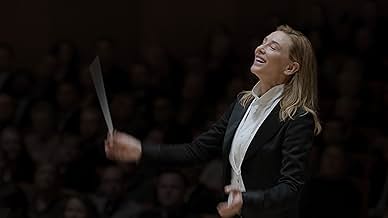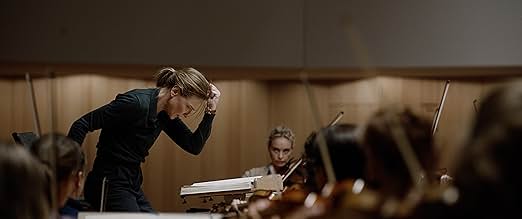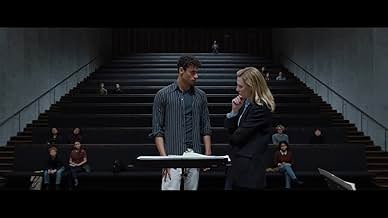Situé dans le monde de la musique classique, le film est centré sur Lydia Tár, considérée comme l'un des plus grands compositeurs/chefs d'orchestre vivants et la toute première femme à la tê... Tout lireSitué dans le monde de la musique classique, le film est centré sur Lydia Tár, considérée comme l'un des plus grands compositeurs/chefs d'orchestre vivants et la toute première femme à la tête d'un grand orchestre allemand.Situé dans le monde de la musique classique, le film est centré sur Lydia Tár, considérée comme l'un des plus grands compositeurs/chefs d'orchestre vivants et la toute première femme à la tête d'un grand orchestre allemand.
- Nommé pour 6 oscars
- 79 victoires et 271 nominations au total
Zethphan D. Smith-Gneist
- Max
- (as Zethphan Smith-Gneist)
Alec Baldwin
- Alec Baldwin
- (voice)
Avis en vedette
It is not surprising that this film is tanking at the box office since it is much too long and slow paced for the average movie goer's attention span. Indeed parts of it, like the agonizingly protracted opening scene where a New Yorker magazine music critic interviews the title character about her classical music esthetics, seem designed by writer/director Tod Field as a boredom experiment wherein if you can survive it without running and screaming into the night out of sheer and utter ennui then you are worthy to see the rest of his "masterpiece".
Thing is, though, that a lot of this film does approach, if not encroach upon, masterpiece territory. Certain scenes, like Lydia Tar's bleak Staten Island homecoming where she summons the spirit of her mentor Leonard Bernstein in an effort to recapture the humanistic values she has lost, are genuinely heartbreaking. And the sequences that deal with Lydia's manipulation of her acolytes are difficult to watch as we see how artistic power feels even more corruptible, somehow, than the political kind, perhaps because it is a profanation of a purer space.
And I think we can all agree that Cate Blanchett is one helluva fine actor! As are Nina Hoss, Noemie Merlant and Sophie Kauer who play various of her entourage/victims.
Bottom line: For all its faults I have a sneaking suspicion that in twenty years they'll be watching this and not "The Fabelmans". Give it a B plus.
Thing is, though, that a lot of this film does approach, if not encroach upon, masterpiece territory. Certain scenes, like Lydia Tar's bleak Staten Island homecoming where she summons the spirit of her mentor Leonard Bernstein in an effort to recapture the humanistic values she has lost, are genuinely heartbreaking. And the sequences that deal with Lydia's manipulation of her acolytes are difficult to watch as we see how artistic power feels even more corruptible, somehow, than the political kind, perhaps because it is a profanation of a purer space.
And I think we can all agree that Cate Blanchett is one helluva fine actor! As are Nina Hoss, Noemie Merlant and Sophie Kauer who play various of her entourage/victims.
Bottom line: For all its faults I have a sneaking suspicion that in twenty years they'll be watching this and not "The Fabelmans". Give it a B plus.
If you are not familiar with classical music, probably almost the entire first hour will be very difficult to sit through. The dialogue is PACKED with references to classical music artists/works/history/etc. Not to mention there are constant little allusions to different plot threads which make up Tar's whole story.
However, this dies down gradually and the movie becomes much more focused and simple. Blanchett is incredible, but not in a showy way at all. Her conducting moments were awesome. The story is political and relevant, and handled very well and balanced-like.
There is a surprisingly creepy vibe to the film, that borders on something almost like a horror movie at times. It's quite unnerving.
One of the best movies i've seen all year! Probably Todd Field's best work yet.
However, this dies down gradually and the movie becomes much more focused and simple. Blanchett is incredible, but not in a showy way at all. Her conducting moments were awesome. The story is political and relevant, and handled very well and balanced-like.
There is a surprisingly creepy vibe to the film, that borders on something almost like a horror movie at times. It's quite unnerving.
One of the best movies i've seen all year! Probably Todd Field's best work yet.
For every era of cinematic history, there are the films that decades later people look at them as the ones that showed a period in time for how it was. Tar will be remembered as one of the movies that defined the early 2020s. It's a complex character study that refuses to take a side, one that shows a deeply complicated person for who she is. This is a downfall story (you can see why Scorsese called it his favorite movie of the year), in which highly successful composer/conductor Lydia Tar falls from grace after allegations (that may or may not be true) emerge that she had a sexual relationship with a student, Krista Taylor, that ended in her suicide. It's an intensely psychological film, with a thin line between what is literally and not literally happening.
An intense character study by definition needs to be driven by a strong performance, and Cate Blanchett delivers not only the best performance of her career, but also the best performance of the year. Every part of her masterful performance is believable. At times she does not seem like a movie character as much as a real person whose life is being broadcast. She is equal parts powerful yet vulnerable, imposing yet fragile, villain yet victim. Blanchett humanizes Lydia Tar and all of her faults in a way that very few completely fictional movie characters are.
Tar is a film driven by well-handled juxtapositions. The primary example (as well as the most successful) is the aforementioned aspects of Lydia Tar's character. The setting of present day Berlin adds to the juxtaposition. It's one of Europe's premier cultural cities, but yet the aesthetic of the film turns it into a claustrophobic, lifeless prison. Even the concert hall of the Berlin Philharmonic, one of the most important venues in classical music, feels limiting. And then, of course, there's the ending. All I'll say is that it took us gamers by surprise.
It is perhaps unexpected for a movie that takes aim at cancel culture to gain traction in the way that Tar did. At a time when people fall in line with hiveminds and nuance is nonexistent, Tar is a movie that shows the deep complications of the human condition, where no one is all good, and no one is all bad. This is a distinctly contemporary aspect that adds a new layer to the classic downfall story, a character arc that has been told for millennia. The corrupting nature of power never changes; Citizen Kane is as relevant now as it was in 1941. The message here is clear: power corrupts not only the individual, but the masses as well.
One of the best things about Tar is the power of what is not shown. Krista Taylor's face does not appear on screen even once. Her voice is never heard either. She is the downfall of Lydia Tar and one of the most important characters in the movie and is completely invisible, and it works perfectly well. This aids the unbiased look at Lydia, by blocking any possibility of our own biases being affected by Krista as a character. Mahler's music is the perfect choice for this movie, as he was one of the great composers of the Romantic era, and is very emotionally driven, especially that 5th Symphony.
In a few decades, people will still be talking about Tar. People will associate Tar with the 2020s the same way they associate Taxi Driver with 1970s urban America, or even Caligari to the Weimar Republic. It will be a window into today's world for future generations. It's a great film back by a fantastic performance that handles its subject matter very well. This is the best film of 2022.
An intense character study by definition needs to be driven by a strong performance, and Cate Blanchett delivers not only the best performance of her career, but also the best performance of the year. Every part of her masterful performance is believable. At times she does not seem like a movie character as much as a real person whose life is being broadcast. She is equal parts powerful yet vulnerable, imposing yet fragile, villain yet victim. Blanchett humanizes Lydia Tar and all of her faults in a way that very few completely fictional movie characters are.
Tar is a film driven by well-handled juxtapositions. The primary example (as well as the most successful) is the aforementioned aspects of Lydia Tar's character. The setting of present day Berlin adds to the juxtaposition. It's one of Europe's premier cultural cities, but yet the aesthetic of the film turns it into a claustrophobic, lifeless prison. Even the concert hall of the Berlin Philharmonic, one of the most important venues in classical music, feels limiting. And then, of course, there's the ending. All I'll say is that it took us gamers by surprise.
It is perhaps unexpected for a movie that takes aim at cancel culture to gain traction in the way that Tar did. At a time when people fall in line with hiveminds and nuance is nonexistent, Tar is a movie that shows the deep complications of the human condition, where no one is all good, and no one is all bad. This is a distinctly contemporary aspect that adds a new layer to the classic downfall story, a character arc that has been told for millennia. The corrupting nature of power never changes; Citizen Kane is as relevant now as it was in 1941. The message here is clear: power corrupts not only the individual, but the masses as well.
One of the best things about Tar is the power of what is not shown. Krista Taylor's face does not appear on screen even once. Her voice is never heard either. She is the downfall of Lydia Tar and one of the most important characters in the movie and is completely invisible, and it works perfectly well. This aids the unbiased look at Lydia, by blocking any possibility of our own biases being affected by Krista as a character. Mahler's music is the perfect choice for this movie, as he was one of the great composers of the Romantic era, and is very emotionally driven, especially that 5th Symphony.
In a few decades, people will still be talking about Tar. People will associate Tar with the 2020s the same way they associate Taxi Driver with 1970s urban America, or even Caligari to the Weimar Republic. It will be a window into today's world for future generations. It's a great film back by a fantastic performance that handles its subject matter very well. This is the best film of 2022.
Everybody writing about this mock biopic focuses on Cate Blanchett's knock-it-out-of-the-park performance, but when compared to Field's "Little Children" (2006), "Tár" lacks the storytelling and editing skills which make the earlier film a masterpiece of human relations, whereas the latter is an interesting character study that somehow collapses under its own weight.
There's a strong establishing scene showing Tár demolishing an aspiring musician's conceited views on Bach, yet one has to wait for a long time for a follow-up showing the main character's boundary issues. The central topic emerges rather quickly (abuse of power), but there are diversions which support character development, yet drag on the narrative, which is probably why many reviews here find the film frustrating.
Being an ex-Berliner, I like the fact that the city is being used as a real location as opposed to the usual tourist / Cold War hot spots, and the Philharmonics rehearsal scenes are very well done, but they don't really push the story forward and could have easily been wound down a bit.
Nina Hoss as Tár's partner is a brilliant counterpoint, because she keeps a good deal of her thoughts to herself until she doesn't, so more focus on their relationship would have helped the story. Hoss would deserve a supporting actress Academy Award nod if only she had more screen time.
The initial scene of conflict eventually loops back into focus, and Field could have used this to explore societal misjudgment as he did in "Little Children" - but he doesn't, which makes "Tár" rather distant and cold. Field expects viewers to interpret a lot on their own, which is bold and demanding, but with this approach it is crucial to keep focus on an underlying message, otherwise it gets lost.
In conclusion, "Tár" has all the ingredients for a masterpiece - interesting characters, great performances, nice camerawork - but weak storytelling ultimately reduces the film's potential.
There's a strong establishing scene showing Tár demolishing an aspiring musician's conceited views on Bach, yet one has to wait for a long time for a follow-up showing the main character's boundary issues. The central topic emerges rather quickly (abuse of power), but there are diversions which support character development, yet drag on the narrative, which is probably why many reviews here find the film frustrating.
Being an ex-Berliner, I like the fact that the city is being used as a real location as opposed to the usual tourist / Cold War hot spots, and the Philharmonics rehearsal scenes are very well done, but they don't really push the story forward and could have easily been wound down a bit.
Nina Hoss as Tár's partner is a brilliant counterpoint, because she keeps a good deal of her thoughts to herself until she doesn't, so more focus on their relationship would have helped the story. Hoss would deserve a supporting actress Academy Award nod if only she had more screen time.
The initial scene of conflict eventually loops back into focus, and Field could have used this to explore societal misjudgment as he did in "Little Children" - but he doesn't, which makes "Tár" rather distant and cold. Field expects viewers to interpret a lot on their own, which is bold and demanding, but with this approach it is crucial to keep focus on an underlying message, otherwise it gets lost.
In conclusion, "Tár" has all the ingredients for a masterpiece - interesting characters, great performances, nice camerawork - but weak storytelling ultimately reduces the film's potential.
How much you enjoy Tar will depend largely on how you feel about a film that begins with the credits. There's good reason for it (everything in Tar is considered down to the smallest detail) but if you can't get on board with that kind of self indulgence then you are in for a long two and a half hours.
One of the reasons for beginning with the credits may be that we are about witness a career in reverse. An opening interview lets us know that Lydia Tar is at the top of her profession, a conductor with a dream resume and an EGOT who is about to complete her masterpiece symphony recording. Over the next couple of hours we see her slipping down the mountain as past deeds and the way she treats people in general come back to take a bite out of her perfect life.
The film solely follows Kate Blanchett's Tar for the entire runtime, we see all events from her perspective and she is in every scene. Blanchett put its an astounding performance, indeed it is hard to imagine many, if any, other actors who could have been up to the task. That the whole show rests on such a powerful but subtle turn is Tar's greatest strength but also its only real weakness. Its a nuanced performance that fits perfectly but added to the characters flawed nature it can at times leave proceedings feeling cold and hard to connect with emotionally. Like its titular character Tar is a film of craftmanship and intellect not emotion, although the themes of hierarchy dynamics and abuse are powerful.
If you can get on board with the full force filmaking style then you will find Tar a breathtaking wonder of a movie with something to think about in every scene and something to ponder long after the (second lot of) credits roll.
9 successful recordings out of 10 symphonies.
One of the reasons for beginning with the credits may be that we are about witness a career in reverse. An opening interview lets us know that Lydia Tar is at the top of her profession, a conductor with a dream resume and an EGOT who is about to complete her masterpiece symphony recording. Over the next couple of hours we see her slipping down the mountain as past deeds and the way she treats people in general come back to take a bite out of her perfect life.
The film solely follows Kate Blanchett's Tar for the entire runtime, we see all events from her perspective and she is in every scene. Blanchett put its an astounding performance, indeed it is hard to imagine many, if any, other actors who could have been up to the task. That the whole show rests on such a powerful but subtle turn is Tar's greatest strength but also its only real weakness. Its a nuanced performance that fits perfectly but added to the characters flawed nature it can at times leave proceedings feeling cold and hard to connect with emotionally. Like its titular character Tar is a film of craftmanship and intellect not emotion, although the themes of hierarchy dynamics and abuse are powerful.
If you can get on board with the full force filmaking style then you will find Tar a breathtaking wonder of a movie with something to think about in every scene and something to ponder long after the (second lot of) credits roll.
9 successful recordings out of 10 symphonies.
Le saviez-vous
- AnecdotesProfessional cellist Sophie Kauer had no prior acting experience and auditioned at the encouragement of a friend. She learned to act by watching YouTube tutorials hosted by Michael Caine.
- GaffesWhen Lydia is talking to the two technicians after a rehearsal in Berlin, she requests they send her audio and video recordings, but the console in front of them in the booth is actually for controlling lights, not audio/video.
- Générique farfeluThe opening credits presents the film crew and acknowledgments (usually shown at the end titles) without presenting the actors. The actors and soundtrack are shown at the ending without the crew.
- ConnexionsEdited from Le projet Blair (1999)
- Bandes originalesDas Wohltemperierte Klavier: Präludium and Fuge C-Dur, BWV 846
Written by Johann Sebastian Bach
Piano, Cate Blanchett
Meilleurs choix
Connectez-vous pour évaluer et surveiller les recommandations personnalisées
- How long is Tár?Propulsé par Alexa
Détails
- Date de sortie
- Pays d’origine
- Sites officiels
- Langues
- Aussi connu sous le nom de
- Tar
- Lieux de tournage
- Dresde, Saxe, Allemagne(Kulturpalast & Großen Garten Platz)
- sociétés de production
- Consultez plus de crédits d'entreprise sur IMDbPro
Box-office
- Budget
- 25 000 000 $ US (estimation)
- Brut – États-Unis et Canada
- 6 773 650 $ US
- Fin de semaine d'ouverture – États-Unis et Canada
- 158 620 $ US
- 9 oct. 2022
- Brut – à l'échelle mondiale
- 29 177 163 $ US
- Durée
- 2h 38m(158 min)
- Couleur
- Mixage
- Rapport de forme
- 2.39 : 1
Contribuer à cette page
Suggérer une modification ou ajouter du contenu manquant



































